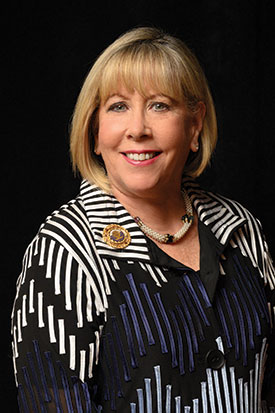Hadassah
President's Column
Proud of Who We Are

Hadassah National President
For generations, Jewish organizations and individuals have been at the forefront of fighting discrimination against minorities. Our teachings about how to treat the stranger in our midst, not to mention our own experiences of marginalization and oppression in countless eras and lands, have reinforced that commitment.
As we approach Passover, it is comforting to imagine that Jewish institutions and people are naturally immune to intolerance, fortified against the impulses that have been at the root of our own hard history. But reality often trails imagination.
We live in an era of diversity awareness. The ingathering of exiles is Israel’s crowning achievement, but there have been hurdles in integrating Ashkenazi, Sephardi and Mizrahi Jews since the state’s early days. And in more recent decades, the challenge has applied to those from Ethiopia and the former Soviet Union as well.
And while America may be pluralistic, most of our immigrant forebears came from monolithic Jewish environments. To this day, the vast majority of American Jews have Ashkenazi backgrounds, and some are susceptible to seeing this family heritage as the Jewish norm.
But the Book of Exodus makes clear that our forebears leaving Egypt were “a mixed multitude,” not only descendants of Jacob’s sons but also intermarried couples and Egyptians who at the hour of our liberation threw in their lot with the Jewish people. Later in the Bible, Ruth created the template for conversion when she told Naomi, “Your people will be my people, and your God my God.”
Diversity itself comes in many forms. “When I converted to Judaism,” said Michele Norris, president of Hadassah’s Tampa Ameet Chapter in Florida, “one of the questions was, ‘You are a woman, you are Black, and now you want to be a Jew?’ I answered with a resounding ‘Yes!’, but there was a segmentation in terms of who I was….
“I was very well accepted in my synagogue,” she continued, “but when I went to places where people didn’t know me, there were always questions on people’s faces: ‘Is she Jewish? She doesn’t look Jewish.’ And I would like people to understand these dynamics, that as a woman of color I stand at a vulnerable juncture of potential sexism, racism, antisemitism and religious intolerance.”
Norris made her observation in a virtual Hadassah event entitled “American Zionist Women of Color,” in which four Jewish women discussed their struggles and resilience. Another participant, Sabrina Kerbel of Hadassah Southern California, recalled that growing up, teachers in her Jewish school in Toronto told her that her family’s customs from India were not only different, but wrong. (The fascinating panel discussion, recorded in October 2020, is on the Hadassah website. Hadassah Magazine will be hosting a new conversation with Jewish women of color on March 16.)
Hadassah was founded to address Jewish vulnerabilities, and that includes the friction that often comes with diversity. The modern era of mass Jewish migrations, reconnection and new blood has offered us the opportunity to fully embrace who we were and who we are.
As a relatively new nation on the cusp of celebrating its 75th anniversary, surrounded by hostile neighbors who are kin to many of its non-Jewish citizens, multicultural Israel faces both the necessity and challenge of fostering equality among Jews as well as between Jews and Arabs living in the state. We can be proud that Hadassah has long been a leader not only in equal access, service and employment in our institutions but also in creating environments where Arabs and Jews can meet in mutual respect and shared humanity.
There is no question that shared space in Israel is expanding—from employment and business settings to political cooperation and friendships. Hadassah encourages this growth by highlighting Arab-Jewish coexistence in Israeli society, as we did in “The Branch,” a podcast series we sponsored for several years.
During Passover, let us remember the mixed multitude from which we come, as we fully celebrate the diversity within and around us. A joyous Pesach to all!










 Facebook
Facebook Instagram
Instagram Twitter
Twitter
Leave a Reply